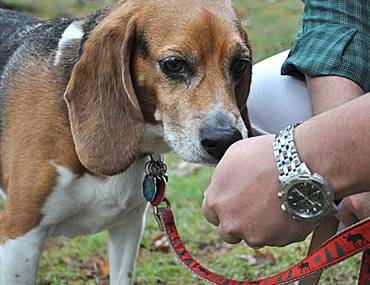Overview and Risk
Inflammatory bowel disease (IBD), is a condition that results when your dog’s immune system turns against the lining of her gastrointestinal (GI) tract, causing an issue with the absorption of nutrients and ability to digest food properly. This wreaks havoc on your dog’s entire GI system, and can impact the stomach and upper small intestine, causing chronic vomiting, and/or the lower intestine, causing diarrhea. IBD is one of the most common causes of persistent vomiting and diarrhea in dogs. Unfortunately, the cause of this debilitating disease often can’t be determined.
Signs
Any dog owner knows that vomiting and/or diarrhea occasionally happen. With IBD, the vomiting and/or diarrhea become frequent, alerting the owner to a problem. Dogs with mild IBD don’t necessarily act sick, other than having GI signs. These dogs remain alert, active, maintain a good appetite, and don’t lose weight.

If your pet has IBD, you may notice the following:
- Diarrhea
- Blood or mucus in stool
- Black, tarry stool (melena)
- Gas
- Straining to defecate
- Increased frequency of bowel movements
- Weight loss
- Increased or decreased appetite
- Lethargy
- Weakness
- Vomiting
- Gurgling gut
- Painful abdomen
- Bloating
Diagnosis/Treatment
Diagnosing IBD begins with a thorough physical examination and tests to rule out other possible causes of the diarrhea and/or vomiting.
These tests may include the following:
- Chemistry tests to evaluate kidney, liver, and pancreatic function as well as sugar levels
- A complete blood count to assess for inflammation, infection, anemia or other blood-related conditions
- Electrolyte tests to ensure your dog is neither dehydrated nor suffering from an electrolyte imbalance
- X-rays of the abdomen to assess organ size and position and rule out obstruction, foreign body, or masses
- An ultrasound to evaluate the integrity of your dog’s digestive tract and other organs
- Specific tests to rule out viral infections, such as parvovirus
- Fecal tests to identify potential fecal parasites
- Special fecal tests, such as cultures and polymerase chain reaction (PCR) testing
- Endoscopy or surgery to obtain biopsies of the stomach and small intestine for definitive diagnosis
If your dog is diagnosed with IBD, your veterinarian will recommend medications that will treat his symptoms.
These may include:
- Antibiotics, if a secondary bacterial infection is suspected
- Anti-inflammatory medications, such as steroids (prednisone), and other medications to suppress inflammation
- Dietary modification, which may include a prescription diet specific for treating IBD
When treating IBD, it is very important to administer all medications prescribed by your veterinarian, as well as to follow any dietary guidelines he/she suggests.
Prevention
Since the exact cause of IBD is unknown prevention is difficult. However, feeding a good quality diet as recommended by your veterinarian and avoiding exposure to table scraps, garbage, plants and other foreign material is the best way to minimize gastrointestinal disease in your pet.
If you have any questions or concerns, you should always visit or call your veterinarian – they are your best resource to ensure the health and well-being of your pets.
